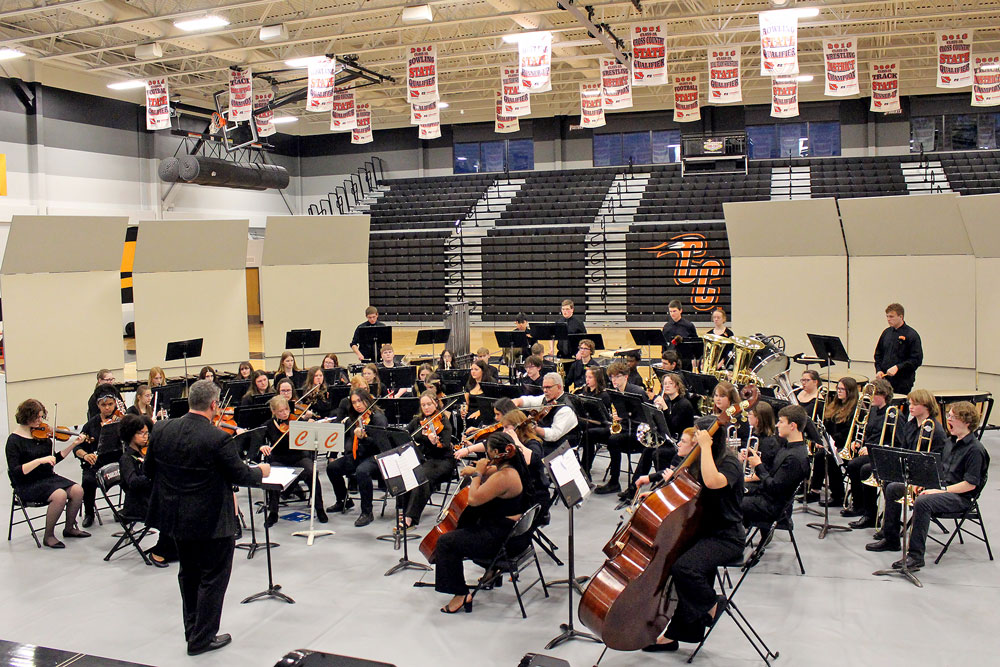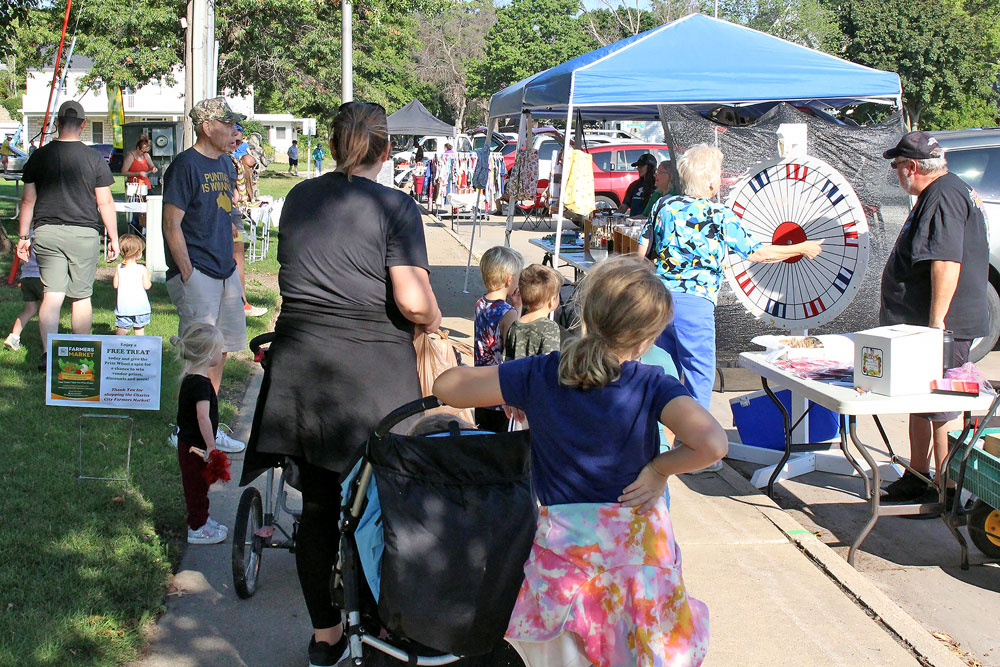Prichard ends first session as minority leader; notes wins, losses

By James Grob, jgrob@charlescitypress.com
Iowa Rep. Todd Prichard, D-Charles City, ended his first stint as Iowa House minority leader on Friday, April 26, and said the job was different than what he expected.
“It was rewarding,” he said. “In a lot of ways it was one of those jobs where if you’re doing it right, you don’t get a lot of attention, but when things go wrong, you’re the first one who has to respond.”
Prichard, who owns Prichard Law Office in Charles City, was chosen to replace Mark Smith of Marshalltown as minority leader when the House Democratic caucus met before the legislative session began. He represents Iowa House District 52, which consists of Floyd, Chickasaw and the eastern third of Cerro Gordo counties.
“It was a whole different experience, being a minority leader compared to being a rank and file member,” Prichard said. “There are a lot more decisions, a lot more responsibilities.”
Prichard said those responsibilities include managing the institution, working with the speaker to coordinate the flow of legislation, and scheduling. He also said that this session there were 22 newly-elected representatives from both parties who needed guidance from leadership.
“That’s a lot of people who have to figure out where things are and how things work,” Prichard said. “You’re never guaranteed a tomorrow, but I think I’ll be back as minority leader next year.”
The 2019 legislative session was highlighted by the passage of bills that authorize farmers to grow hemp, gamblers to bet on sports and a requirement that local governments publicize and get a supermajority vote on property tax increases.
Each of those measures still needs the signature of Gov. Kim Reynolds, who saw some of her own priorities pass but others left for another day.
Reynolds received approval for her priority measure to establish a mental health care system for children, but could not get senators to approve a constitutional amendment that would restore voting rights to felons.
The 2019 session ended a week earlier than scheduled, with bills on gun rights, abortion, animal abuse penalties, traffic cameras, Medicaid work requirements and solar energy fees left unfinished.
Prichard said his biggest disappointment coming out of the session was the fact that Iowa’s Medicaid problem wasn’t addressed.
“The health care system and the Medicaid system in Iowa is so broken,” Prichard said. “There was no discussion from the majority as to how to deal with that. There was nothing they were willing to entertain that would put oversight into the system.”
During the session, Iowans learned that 420,000 of them could be facing another health care disruption when UnitedHealthcare announced it is leaving Iowa’s managed care program.
“We had a bill to restore long-term care, and all the Democrats signed to that,” Prichard said. “We didn’t even get a committee hearing on that.”
Prichard said that legislation intended to deal with pharmaceutical oversight also failed.
A bill that would have required tens of thousands of Medicaid recipients to work to keep their benefits also failed to advance despite support from some Republicans, who argued there was a “groundswell of support” for work requirements.
State officials said about 60,000 people could have been affected. Opponents said it could kick people off Medicaid who must stay home, such as to care for a parent with Alzheimer’s.
The Legislature did pass a children’s mental health bill that creates a children’s behavioral health system, a state board. The bill also assigns new duties to the Department of Human Services. It also establishes regional mental health services provided through the adult Mental Health and Disability Services system.
On Friday, Reynolds signed that bill, which also prohibits the use of Medicaid funding to pay for sex-reassignment surgery.
Republicans added the prohibition on the final day of the session, saying it was a response to a recent Iowa Supreme Court decision that said the state couldn’t deny two transgender women Medicaid coverage for sex-reassignment surgery. The new legislation writes into state law that the Civil Rights Act does not require government bodies to cover the surgery.
The law, which is likely to be challenged in court, also contains a provision that would bar Planned Parenthood from helping to fund state sexual education programs.
Prichard said he was unhappy with the way that bill came through the Legislature. He said lawmakers were prepared for a long day on the final Friday of the session, but the controversial items tacked onto he HHS bill came to the floor out of the blue.
“It was all done that last day,” he said. “It changes the civil rights code, it eliminated certain health care procedures, and it cut funding for sex education.”
He said he thought Republicans threw pragmatism out the window as a way to score political points.
“They passed what I would call cruel legislation regarding people who are transgendered,” Prichard said. “Instead of being pragmatic problem solvers, they played politics, and that’s the wrong answer.”
Among other bills that passed both houses, a bill legalizing growing hemp was sent to Reynolds. It allows licensed growers to cultivate the crop on up to 40 acres. Industrial hemp can be used in food, fiber, paper and other products.
“I definitely supported that,” Prichard said. “That’s legislation that will open up some markets in Iowa. That could be helpful for economic development.”
Lawmakers also approved a bill to authorize casinos, under the regulation of the Iowa Racing and Gaming Commission, to roll out betting on professional, collegiate and international sporting events, including motor racing. It excludes betting on some events, including minor leagues and in-state college team players. The bill also legalizes fantasy sports contests and internet fantasy sports betting.
“That’s something I did not support,” Prichard said. “At the end of the day, there are questions if there is enough funding for addiction services, and if there is enough protection for amateur athletes in the state.” Prichard said he’s been told the governor is in the fence as to whether she will sign the bill into law.
A constitutional amendment declaring a right of the people to keep and bear arms passed this year. It declares any and all restrictions on gun rights shall be subject to strict scrutiny, which requires a higher bar for a court to reach before gun laws can be struck down. Prichard said he supported a version that would “incorporate the Second Amendment into the Iowa Constitution.”
That bill must be passed a second time before going to voters. It was one of several gun rights expansion bills proposed this session, but many failed to move forward, including one that would have eliminated the requirement to get a permit to own or buy a handgun.
A felon voting rights bill passed the House with a strong bipartisan vote of 95-2, but it couldn’t pass the Senate, as some senators wanted to require total repayment of restitution and exclusion of those convicted of murder, rape, or child molestation.
“I thought that was a good bill. I was surprised the Senate didn’t take it up,” Prichard said. The bill was a top priority for Reynolds, and Prichard said that the governor can take action and restore some voting rights on her own, if she wants.
Lawmakers also passed a property tax bill that forces counties and cities to publicize and pass by a two-thirds vote any property tax increase over 2 percent.
“I was a no on that one,” Prichard said. “That was a total grab on local control. It could make it very hard for county and city governments to manage themselves. It took too much power away and limited the flexibility of cities and counties.”
One bright spot of bipartisanship for both houses and both parties was the passage of Logan’s Law, which Prichard called “an example of how we’d like things to work.”
The law is named in honor of Logan Luft, a Charles City youth who was 15 years old when he died due to injuries after an ATV accident in July of 2017. The law would let Iowans put a symbol on their hunting and fishing licenses indicating they wish to be an organ donor.
Prichard sponsored the legislation in the Iowa House while Sen. Waylon Brown, R-St. Ansgar, sponsored it in the Iowa Senate, and it passed both houses unanimously.
Reynolds will sign it into law at 10:30 a.m. Monday, when the Charles City School District will host Reynolds, Prichard, Brown and Wendy and Lenny Luft and family for a signing ceremony in the Comet Gym at Charles City Middle School.








Social Share